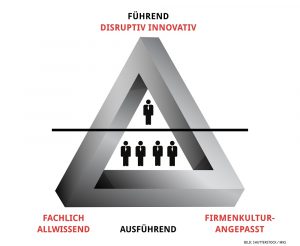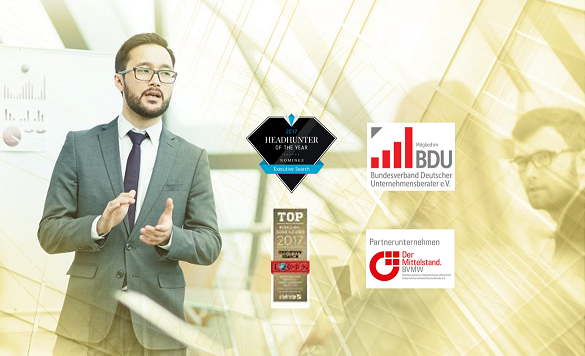In the first part of this series, we explored the magic of this triangle. It led us to the difficulty of clearly defining these critically important dimensions, some of which are in competition with each other, on the company side when selecting candidates or on the candidate side when deciding on a new employer, and then putting them on the fit test bench. After all, it’s all about sustainably successful job placements, or in other words: it’s about the mutual return-on-investment in a new working partnership – economically as well as socially.
It’s as simple as it is difficult. But there is “good news.”
In his hermeneutic dialectics, i.e. the doctrine of understanding, the German philosopher Hans-Georg Gadamer repeatedly emphasized the primacy of the question over the answer, or the art of asking the right questions (of oneself and others). With these questions, after all, he lived to be 102 years old. So, here we go!
WITH SELF-REFLECTION AND THE RIGHT QUESTIONS TO THE OPTIMAL FIT
SELF-REFLECTION IS A GOOD START.
For companies, firstly, there is nothing more practical than a clear description of the corporate values, the so-called “Visions, Missions & Ambitions”, the leadership values and, of course, the ecology, i.e. clear publicly made statements about the corporate culture. And they all have them! Checked off? However, it is advisable to regularly examine these with self-reflection.
Check whether these correspond to the company reality and future objectives, i.e. actually represent the assessment measure for the degree of “cultural fit” of suitable candidates, or are altogether more wishful thinking on whose path to achievement candidates (hereafter m/f/d) with a very specific profile can particularly contribute. This means work for the entire management team of the company, ideally moderated by more neutral third parties.
THE PRIMACY OF CORPORATE CULTURE.
According to a study by StepStone (Recruiting with Personality 2017), corporate culture is important to almost all skilled workers. More than 60% felt misled about it in job interviews and a third cannot identify with it at all in the employment relationship.
A finding from an employer evaluation portal: “The still prevailing leadership culture lets the prayer mill-like preaching of the company values fade to empty phrases. Leadership is based on the principle: There can only be one! …dangerous if this all-knowing One does not allow any other opinion besides his own” Here, wishful thinking and practice do not quite coincide. What kind of “cultural fit” is needed here in reality?
Second: Company websites and brochures on the subject of corporate culture are usually filled with goals and values. Which of these are particularly critical to success and therefore “must-haves” with which a candidate can score points? “Highlight” these for yourself and in your external presentation. If company culture fit, specialist knowledge and skills, disruptive innovative ability are important requirement characteristics for the position to be filled, but in reality are hardly equally pronounced in candidates, where are you prepared to make compromises?
 We’ll get to good questions to better understand the “fit” in this regard in the selection process in a moment.
We’ll get to good questions to better understand the “fit” in this regard in the selection process in a moment.
Now to the candidate. Hardly any candidate fails to study the published information about the company and, in particular, the statements about the corporate culture in preparation for a job advertisement and, at the latest, for the selection interview. It is not uncommon for us to read in the motivation letter “The goals and values of your company particularly appeal to me because … .” Hand on heart! If asked, many candidates could probably list these by heart in the interview. This is because, on the one hand, the self-presentation of companies is basically very professional and attractive – a top job of corporate communications and employer branding, and on the other hand, because as a candidate you naturally want to please, i.e. show a good “fit”.
Ladies and gentlemen candidates! In addition to the many important wishes and requirements you have for your future employer and for the position to be filled, give yourself time in advance to think about the culture that best matches your goals and values and in which you can be successful. Am I someone who wants to actively contribute to the success of a clearly defined work environment with unambiguous structures and processes? Or am I rather someone who wants to proactively achieve innovative success in a dynamically changing, ambiguous work environment, with “out-of-the-box” thinking and action, whether in an executive or leadership position. Here, for example, professional coaching can also be helpful.
We will also come to your questions in a moment, in order to better understand the “fit” in this regard in the process of getting to know each other.
TIME FOR GOOD QUESTIONS.
Who doesn’t have a list of questions or a checklist or something similar? And there are many and many good ones. Whether in the initial contact with the personnel consultant, in telephone interviews, video conferences, and/or with potential analysis or personality test online in addition and then in personal meetings with representatives of the company – questions about questions! And (almost) everyone is well prepared.
HR works through the personnel questionnaire, the department (its specific requirements and the “executive” questions are the “tipping point”. The candidate has prepared well for the generally known standard questions and can, of course, present his/her CV again in more detail. And then he/she is invited to ask his/her questions. Unfortunately, there is often too little time left for this at the end of the interview and some important things are missed out (perhaps because too many questions were asked unilaterally, the CV, which is already available in writing, was presented again orally, unnecessarily in too much detail, because the most important “facts & figures” were worked through first or because he/she does not want to leave a critical impression with sensitive questions.
How about a few sample questions that help to better understand the “fit” in the magic triangle?
1. Company: What was the most innovative or extraordinary thing (at its time) you ever did in a company and how did you make it a success? How did you deal with setbacks?
This question (related to an example of idea-implementation-result) provides insights into the candidate’s courage, perseverance and ability to bring about (disruptive) positive changes to the company’s competitiveness. Candidates who convince here with a good story, who show “rough edges”, i.e. who do not only behave in an adapted approving manner during the interview, e.g. react rather critically to a question, are most likely to be valuable “game changers”.
Tip: With these personalities, expect questions about the company’s leadership style and culture of error.
2. Candidate: Why is this position being (newly) filled? What special (new) work or behavioral patterns are expected of me? How is the work in this team structured today? How do you define the success that is expected in this job? What is the prevailing leadership style in the area or department?
From the answers to these questions, asked one after the other, the candidate hopes to gain insights into the actual working culture practiced “on the job”. He/she should ask some of these questions, if possible, to the representatives of the department or, better yet, directly to the future supervisor. With the latter, he/she wants to find out whether and to what extent “the chemistry is right.” Concrete, honest answers here increase the chance enormously that the cognitive dissonance between expectations and real circumstances will remain as small as possible later on.
Tip: When asking these questions, expect answers that will be very much in line with the declared corporate culture. If you need explanations or have doubts, ask more specific or in-depth questions!
We, the QRC Personalberatung International in Fuerth with several locations, are available to you competently and industry-specialized in the occupation of demanding positions very gladly for a first exchange!
In addition to qualified specialists, we are looking for specialists and managers who approach their tasks with competence, passion and enthusiasm. Together with our clients and candidates, we relate the requirements and convictions of one side to the convictions and needs of the other side in order to achieve the best possible match. Together with our clients, we ask the right questions and set the course for an optimally suitable staffing with sustainable support.
Contact us!
Managing Partner of the QRC Group
Fuerth / Essen / Kaiserslautern
Tel.: +49 911 237 33 277
Mobil: +49 170 7979880
E-Mail: marion.kaeser-seitz@qrc-group.com






